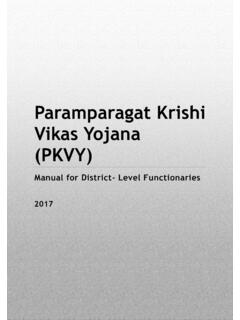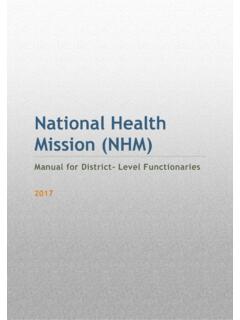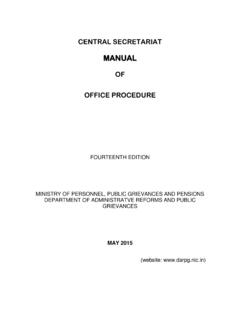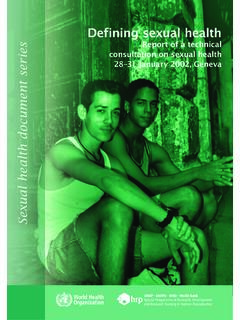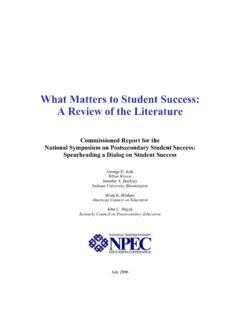Transcription of SECOND ADMISTRATIVE REFORMS COMMISSION
1 FIRST REPORTSECOND ADMISTRATIVE REFORMS COMMISSIONRIGHT TO INFORMATIONJUNE 2006 Master Key to Good GovernanceSecond Administrative REFORMS CommissionGovernment of India2nd Floor, Vigyan Bhawan Annexe, Maulana Azad Road, New Delhi 110 011e-mail : website : ADMISTRATIVE REFORMS COMMISSIONGOVERNMENT OF INDIASECOND ADMINISTRATIVE REFORMS COMMISSIONFIRST REPORTRIGHT TO INFORMATIONMASTER KEY TO GOOD GOVERNANCEJUNE 2006 PREFACEThe SECOND Administrative REFORMS COMMISSION has been constituted to prepare a detailed blueprintfor revamping the public administration system. The COMMISSION has been given wide terms of referencecovering all aspects of public administration. The COMMISSION in its first report decided to analyze andgive recommendations on the freedom of information as the Right to Information Act has been enactedrecently and is a paradigm shift in Right to Information Act is a path-breaking legislation which signals the march from darkness ofsecrecy to dawn of transparency.
2 It lights up the mindset of public authorities, which is clouded by suspicionand secrecy. Openness in the exercise of public power Executive, Legislative or Judiciary is a culture,which needs to be nurtured, with privacy and confidentiality being an exception. The right to informationwill also be a powerful means for fighting corruption. The effective implementation of the Right toInformation Act will create an environment of vigilance which will help promote functioning of a moreparticipatory Madison once said, A people who mean to be their own governors must arm themselves withpower that knowledge gives . In India, the Official Secrets Act, 1923 was a convenient smokescreen todeny members of the public access to information. Public functioning has traditionally been shrouded insecrecy. But in a democracy in which people govern themselves, it is necessary to have more openness.
3 Inthe maturing of our democracy, right to information is a major step forward; it enables citizens to participatefully in the decision-making process that affects their lives so is in this context that the address of the Prime Minister in the Lok Sabha is significant. He said I would only like to see that everyone, particularly our civil servants, should see the Bill in a positive spirit;not as a draconian law for paralyzing Government, but as an instrument for improving Government -citizen interface resulting in a friendly, caring and effective Government functioning for the good of ourpeople . He further said, This is an innovative Bill, where there will be scope to review itsfunctioning as we gain experience. Therefore, this is a piece of legislation, whose working will be keptunder constant reviews. The COMMISSION , in its report , has dealt with the application of the Right to Information in Executive,Legislature and Judiciary.
4 The Judiciary could be a pioneer in implementing the Act in letter and spiritbecause much of the work that the Judiciary does is open to public scrutiny. Government of India hassanctioned an e-governance project in the Judiciary for about crore which would bring aboutsystematic classification, standardization and categorization of records. This would help the Judiciary tofulfil its mandate under the Act. Similar capacity building would be required in all other public transformation from non-transparency to transparency and public accountability is the responsibilityof all three organs of COMMISSION is benefited by the deliberations at the Colloquium organized by the National JudicialAcademy and inputs from various stakeholders. The COMMISSION studied various laws on the subjectincluding of other countries; it studied relevant reports of various Commissions and Committees and heldseveral rounds of deliberations with State Governments.
5 This report , which gives practical recommendationsto bring in a regime of freedom of information, is an outcome of the above efforts. I am confident that theimplementation of this report will usher in a new era of accountable and transparent administration.(M. Veerappa Moily)ChairmanGovernment of IndiaMinistry of Personnel, Public Grievances & PensionsDepartment of Administrative REFORMS and Public GrievancesResolutionNew Delhi, the 31st August, 2005No. K-11022/9/2004-RC. The President is pleased to set up a COMMISSION of Inquiry tobe called the SECOND Administrative REFORMS COMMISSION (ARC) to prepare a detailedblueprint for revamping the public administration COMMISSION will consist of the following :(i)Shri Veerappa Moily - Chairperson(ii)Shri V. Ramachandran - Member(iii)Dr. Mukherjee - Member(iv)Dr. Kalro - Member(v)Dr. Jayaprakash Narayan - Member(vi)Smt.
6 Vineeta Rai - COMMISSION will suggest measures to achieve a proactive, responsive, accountable,sustainable and efficient administration for the country at all levels of the government. TheCommission will, inter alia, consider the following :(i)Organisational structure of the Government of India(ii)Ethics in governance(iii)Refurbishing of Personnel Administration(iv)Strengthening of Financial Management Systems(v)Steps to ensure effective administration at the State level(vi)Steps to ensure effective District Administration(vii)Local Self-Government/Panchayati Raj Institutions(viii)Social Capital, Trust and Participative public service delivery(ix)Citizen-centric administration(x)Promoting e-governance(xi)Issues of Federal Polity(xii)Crisis Management(xiii)Public OrderSome of the issues to be examined under each head are given in the Terms of Referenceattached as a Schedule to this COMMISSION may exclude from its purview the detailed examination ofadministration of Defence, Railways, External Affairs, Security and Intelligence, as alsosubjects such as Centre-State relations, judicial REFORMS etc.
7 Which are already being examinedby other bodies. The COMMISSION will, however, be free to take the problems of these sectorsinto account in recommending re-organisation of the machinery of the Government or ofany of its service agenciesSome of the issues to be examined under each head are given in the Terms of Referenceattached as a Schedule to this COMMISSION will give due consideration to the need for consultation with theState COMMISSION will devise its own procedures (including for consultations with theState Government as may be considered appropriate by the COMMISSION ), and may appointcommittees, consultants/advisers to assist it. The COMMISSION may take into account theexisting material and reports available on the subject and consider building upon the samerather than attempting to address all the issues ab Ministries and Departments of the Government of India will furnish suchinformation and documents and provide other assistance as may be required by theCommission.
8 The Government of India trusts that the State Governments and all othersconcerned will extend their fullest cooperation and assistance to the COMMISSION will furnish its report (s) to the Ministry of Personnel, PublicGrievances & Pensions, Government of India, within one year of its constitution( Suvrathan)Additional Secretary to Government of IndiaCONTENTSC hapter 1 Introduction1 Part-IOFFICIAL SECRETSC hapter 2 Official Secrets Act and Other Official Secrets Privilege in Oath of Organisations18 Chapter 3 Rules and Central Civil Services (Conduct) Manual of Office Procedure21 Chapter 4 Confidentiality Classification23 Part-IIIMPLEMENTATION OF THE RIGHT TO INFORMATION ACTC hapter 5 Rights and and Obligations Under the Information Officers and Appellate Authorities Information and Record Building and Awareness Mechanism35 Chapter 6 Issues in of the of Public Window Agency at District Field Offices and Public to Non Governmental Limit for Information Beyond 20 for Redressal of Public and Vexatious Requests47 Chapter 7 Application of the Right To Information50 Act to the Legislature and the JudiciaryChapter 8 Removal of Difficulties54 Conclusion56 Summary of Recommendations57 LIST OF ANNEXURESA nnexure-I(1)List of participants at the National Colloquium70 Annexure-I(2)Recommendations of the Colloquium74 Annexure-I(3)Questionnaire83 Annexure-I(4)
9 Case studies96 Annexure-I(5)A Comparative Analysis of the Right to Information Act of different States103 Annexure-I(6)A Comparative Analysis of International Laws on Freedom of Information110 Annexure-V(1)List of States which have constituted Information Commissions117 Annexure-V(2)Number of CPIOs/PIOs appointed by various Ministries/ Departments118 Annexure-V(3)Responses of some Ministries/Departments about status of record-keeping119 Annexure-VI(1)The Inverted Tree concept for maintaining inventory of the public authorities120 LIST OF ABBREVIATIONS USEDAPIOA ssistant Public Information OfficerBSFB order Security ForceCAGC omptroller and Auditor GeneralCICC entral Information CommissionCPIOC entral Public Information OfficerCRPFC entral Reserve Police ForceGOIG overnment of IndiaNCRWCN ational COMMISSION to Review the Working of the ConstitutionNICN ational Informatics CentreNSAN ational Security ActOSAO fficial Secrets ActPGCP ublic Grievances CommissionPIOP ublic Information OfficerPROP ublic Records OfficeRTIR ight to InformationSICS tate Information COMMISSION If liberty and equality, as is thought by some are chiefly to be found in democracy, theywill be best attained when all persons alike share in the government to the utmost.
10 Right to information has been seen as the key to strengthening participatory democracyand ushering in people centred governance. Access to information can empower the poorand the weaker sections of society to demand and get information about public policies andactions, thereby leading to their welfare. Without good governance, no amount ofdevelopmental schemes can bring improvements in the quality of life of the citizens. Goodgovernance has four elements- transparency, accountability, predictability and refers to availability of information to the general public and clarity aboutfunctioning of governmental institutions. Right to information opens up government s recordsto public scrutiny, thereby arming citizens with a vital tool to inform them about what thegovernment does and how effectively, thus making the government more in government organisations makes them function more objectively therebyenhancing predictability.

